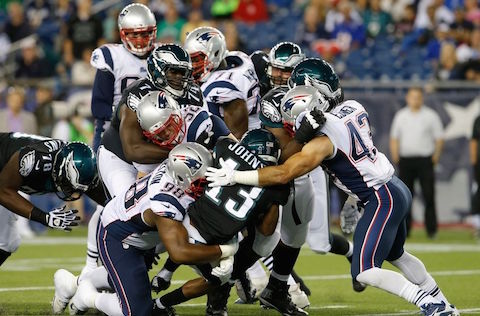Lessons of the steely-eyed squeaker swiper: Christopher L. Gasper’s metaphor overload

Christopher L. Gasper is a Boston Globe sportswriter. His metaphors startle the reader, jarring you from the trance of reading and making you say “wha?” Learn from his excesses.
I’ve recommended that you avoid cliches in your writing. Don’t say “dumb as a post” if you can say “dopey as Sarah Palin.” But there’s a limit. When enough creative metaphors pile on, they draw attention to themselves; they’re distracting, not enlightening. In this respect, Christopher L. Gasper‘s writing never disappoints. Like the New England Patriots’ defensive linemen, his metaphors hit you from unexpected angles, pummel you, and just might give you a concussion.
I’ve highlighted some examples from today’s article “Patriot Way paved with last-second wins” (my comments follow in italics). Please note that there were at least twice this many metaphors in the article; I’ve only sampled the egregious ones.
What makes the Patriots the Patriots is that they can beat you by any means necessary. They can blow you out, methodically break your will, or swipe a squeaker in steely-eyed fashion. [Watch out for that steely-eyed squeaker swiper!]
The Little Engine That Could has morphed into a European bullet train. [Extra points for any metaphor that uses the word “morph.”]
The Patriots have had their share of fortuitous footballs happenings over the years, and their opponents do tend to melt under pressure like they’re auditioning for “The Wizard of Oz” remake. [Like any questionable metaphor, this one made me stop and think too long. Auditioning for the “Wizard of Oz”? Melt under pressure? Oh, I get it, like the witch. But she melted under water, not pressure. As for “fortuitous footballs happenings,” I think that extra “s” on “footballs” is just a typo, but when it comes to the fertile mind of Gasper, you never know.]
Coach Bill Belichick and quarterback Tom Brady have a canon of clutch performances that will land them in Canton. [Gasper likes alliteration. Hence the clutch canon in Canton. That’s where we grasp the greatness of the gods of the gridiron.]
They outmaneuvered Manning and Coughlin with clear-headed clock management by Belichick, composed quarterback play from Brady, and steel-stomached execution by Gostkowski. [You had me until the “steel-stomached.” Pro tip: metaphors shoehorned into compound adjectives tend to fit awkwardly.]
This is a league where all three of those positions [quarterback, coach, kicker] get changed with the frequency of someone flipping through radio stations. That degree of continuity, stability and ability at three vital positions has buttressed the Patriots’ metronomic success. [Radio stations, ok. Buttresses, ok. Metronomes, ok. But metronomes buttressing amid radio cacophony? That’s your ticket to the Super Bowl of mixed metaphors.]
The capper to Brady’s 49th career fourth-quarter comeback was more functional than football artistry. It was not a drive for his scrapbook or his Facebook page. [Either the scrapbook or the Facebook page would be fine. You don’t need both.]
. . . [M]aybe, it’s a veteran head coach who knows how thin the line is between the joy of victory and the agony of defeat. [Cliche alert. And no, you don’t get a pass for turning the “thrill of victory” into the “joy of victory.”]
Metaphors used appropriately enliven writing. Overused, overstretched, over-weird metaphors distract. Sportswriters get extra leeway, but even in sports there are limits. Just as you wouldn’t throw every spice in the spice rack into your stew, use a little restraint with alliteration and metaphors. Your job is to make us feel smart, not to prove how clever a writer you are.
A 1974 (encouraging) rejection letter from Ben Bradlee at the Washington Post:
In all of your work, I see you reaching for effect. Unfortunately, I see the reaching and not the effect.